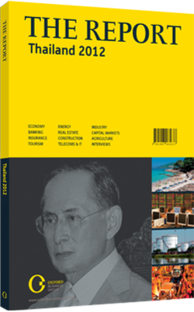Golden opportunities: The derivatives market is continuing to expand
With the introduction of oil futures, the growing market for derivatives in Thailand took another step in October 2011. If the new option proves as popular as the previous year’s addition, gold futures, the Thailand Futures Exchange (TFEX) will see another big jump in trading activity in 2012.
ALL THAT GLITTERS: The highlight of derivatives-trading activity in 2011 was two gold futures contracts and also the introduction of an evening trading session. It was the first full year of trading in gold futures, and the overall number of contracts traded surged 120% to a daily average of 41,145. The TFEX had introduced a derivative contract of 50 Thai gold baht in February 2010. It followed that with a 10 gold baht contract in August 2011.
Although a futures contract that was based on the SET50 benchmark equities index accounted for 43% of total activity, the gold contracts followed closely behind at 40%. There were a total of 3.99m gold contracts traded on the year, according to TFEX data, up from 971,423 in 2010. As a whole, that rate of expansion outpaces that of the market.
The gold rally of 2011 certainly explains much of the growth – in August of the same year gold surged to a historical high of $1917.9 in New York. But the TFEX service is also key to understanding the popularity of the new derivative. During that rally, the daily volume of contracts traded spiked at times to about 90,000, according to MTS Gold Group, the largest gold broker of derivatives contracts in the country.
NIGHT MOVES: Much of the activity came during the evening session, which runs from 7.30pm to 10.30pm. Overall, 30% of the year’s increase in total trades on the exchange came from gold contracts traded during these hours. Night trading for derivatives of any sort has proved popular because the latter part of the session is concurrent with trading hours in New York.
Gold is also a commodity Thais are comfortable with, so the jump from using physical gold as an investment to using a derivatives contract is a relatively simple one to make in comparison to many other commodities. The gold shops of Bangkok’s Chinatown have for years served as a trading platform for gold. Thailand has the second-largest number of gold shops by country at about 7000, reflecting not just Thai demand and investment but also Bangkok’s role in the global trade in gems and precious metals.
“Thailand’s gold derivatives market has grown very rapidly in recent years on the back of a very big physical gold market and Thais’ affinity for gold as a security,” said Kritcharat Hirunyasiri, the CEO of MTS Gold Group, a specialist brokerage. “While the physical and derivatives markets are still quite separate, investors are tending to shift from over-the-counter to the exchange.” MTS is one of the five most active brokers on the TFEX, accounting for 5.67% of all trading and 14.1% of trading in precious metals, according to data from TFEX from January 2012.
SILVER FUTURES: With the derivatives experience in the country so far, it is not clear whether familiarity with the underlying asset is a requirement to generate enough interest or just a good start. Silver is another metal that is familiar to Thais, though mostly in the context of industrial applications and jewellery. A silver futures contract has been introduced by TFEX; however, interest has been lower than that for gold, according to Kritcharat. This is perhaps an indication that retail investors in particular simply know gold and its price fluctuations better. “Although there is a substantial market for physical silver in Thailand, silver derivatives have only experienced slow growth in trading as there is still a knowledge gap for this commodity,” Kritcharat said.
OIL FUTURES: TFEX’s oil contracts, the newest on the list, are initially aimed at local investors, many of whom would potentially be firms wanting to manage risks associated with energy costs through hedging. However, at the product’s launch in October 2011 TFEX officials said the firm hoped international investors would eventually also use the market’s trading platform.
You have reached the limit of premium articles you can view for free.
Choose from the options below to purchase print or digital editions of our Reports. You can also purchase a website subscription giving you unlimited access to all of our Reports online for 12 months.
If you have already purchased this Report or have a website subscription, please login to continue.

